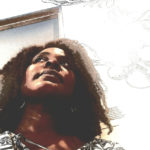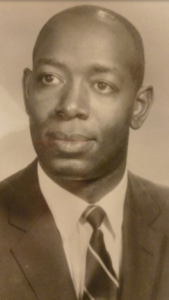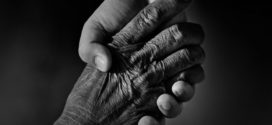 In her 1985 one-woman show, Whoopi Goldberg morphed into a child and draped a shirt over her head to stand-in for long, blond hair. That piece of her show was real for me. My sister, Fox, and I used cardigans. Heavier than a blouse, a cardigan stayed in place without fussy re-adjusting, the neck- band shaped itself around our heads, the arms gave us long locks to flip back over our shoulders, the body of the sweater draped down our backs. Cardigans made excellent white-girl hair.
In her 1985 one-woman show, Whoopi Goldberg morphed into a child and draped a shirt over her head to stand-in for long, blond hair. That piece of her show was real for me. My sister, Fox, and I used cardigans. Heavier than a blouse, a cardigan stayed in place without fussy re-adjusting, the neck- band shaped itself around our heads, the arms gave us long locks to flip back over our shoulders, the body of the sweater draped down our backs. Cardigans made excellent white-girl hair.
Because, like Whoopi’s character in Spook Show, we weren’t just pretending to have long, luxurious hair. We were pretending to be white.
Growing up, I was very much aware of being Black, of Black history, of interesting and important people and events in that history. My family, with no coy nod to subtlety, steeped my brother, sister, and me in Black facts.
And yet—the awkward parallel to that truth—when Fox and I created our favorite game to play in our room after lights-out, the girls we were in that game were white. Automatically. No question, no discussion or hesitation.
Along with Black history, we’d learned that beauty, popularity, and success required whiteness. Even in our house with “Afro-American” history calendars and comics, with volumes of The Negro Almanac, with Black history flashcards, books by Wright, Baldwin, Angelou. All that pride in Blackness, but Fox and I had still come to understand that who we were as Black girls were less than, wasn’t who we should aspire to be if we wanted the kinds of lives we saw on TV and in the movies.
In middle school, I began straightening my hair—first with a hot comb, later with a relaxer.1 I hated straightening my hair. Hated having to set it every night. Hated the smell of the relaxers, the smell of the oil frying as I pulled the hot comb through, the smell of my skin frying when my hand slipped, the ugly, painful burns from both processes, that time my hair fell out by the clump-full after leaving a too-strong relaxer in for too long.
I hated how useless and high maintenance my straightened hair was. Rain, humidity, breaking a sweat … they all ruined whatever ‘do I was trying to rock. I spent hours washing, re-straightening, then curling it.
And my hair hated being processed. I see women with relaxed hair, and their hair looks fabulous—shiny, flexible, easy. My hair was in full revolt against my straightening efforts. It was dry and faded, definitely not loving me and my choices.
But straightening gave me a simulacrum of “good” hair, of white-girl hair. There was nothing about me and my dark skin that would ever resemble whiteness, but I could poison and burn my hair into a stiff, brittle verisimilitude.
I spent middle and high school in a town that was white people, my family, and the other Black family. My Blackness was an oddity best ignored. Blackness was freakish, and my friends worked hard to help me see how much it didn’t bother them. They told me—often—how they didn’t even think of me as a Black person. They described me to people who didn’t know me and never mentioned my color because that erasure seemed kindest, most polite. They could say they hated Mick Jagger’s “nigger lips” because it never occurred to them that it would be offensive to me. Boys could say I was pretty even though I was Black—both disproving the claim that no one thought of me as Black and making sure I knew that being Black meant I started any accounting at a deficit.
Still, I wouldn’t say I actively, aggressively wished I was white. Yes, in my fantasies about boys I was always white, but of course, that was true. I had plenty of guy friends, had crushes on a few of them, but I was never in the running to date any of them. As a few were honest (and heartless) enough to tell me, they didn’t actually think of me as a girl. So I adapted my fantasies accordingly.
Looking at that last paragraph is jarring. I am forced to see my past more accurately, to see what I hid so expertly from myself at the time. My shame.
Shame manifests in so many ways. I say I didn’t actively wish I was white, and that’s true enough as far as it goes. But I was fully aware that my Blackness set me apart in ways my body didn’t. Color, was a bigger barrier than my size. Fat girls dated. I saw the evidence of that all the time. Fat could be gotten around. There was no getting around my Blackness.
(Yes, I knew there were men who had no problem with my Blackness. The white man who propositioned me when I was 13 and the one who molested me when I was 14 wasn’t fazed by the distastefulness of my color. My Blackness was acceptable when all I needed to be was an accessible female body. But I understood that being a predator wasn’t the same as being a boyfriend.)
Seeing myself as less than, as unacceptable, was entirely wrapped up in my Blackness. That awareness lived uncomfortably side by side with my understanding that Black folks had accomplished incredible things, that my history books in school included none of the histories I learned from books at home. I could feel pride in those people, in that history, but it didn’t undo the shame I felt in what was clearly my inferiority.
That shame was buried deep, so well camouflaged, I never saw it, never recognized it. I never named it until I started writing this essay. How could I be ashamed of being Black? I had such a solid foundation in Black love, Black intelligence, strength, capability.
This is how strong White Supremacy is, how powerful and insidious. This is the way racism, prejudice, and implicit bias takes our children, even when we are working overtime to keep them safe and proud and strong.
If you had asked me then, I would have told you I was proud of being Black. I would have told you about Mary McLeod Bethune and Miriam Makeba, about the Black Panthers, Harriet Tubman, and Shirley Chisholm, about Daniel Hale Williams, Daisy Bates, Deadwood Dick.
I wouldn’t have told you about the other lessons I was learning, the messages I was receiving loud and clear about my worth in the world. I wouldn’t have told you about seventh grade when I was called a nigger in the middle of class and I was the only person who thought that was a problem. I wouldn’t have told you about that cardigan on my head.
When I began to wear my hair natural again, it wasn’t a decision I made from pride in my Blackness. It became that and certainly remains that, but it started because I was fed up with relaxers and thought I should start at square one.
You’ll have noticed that I’m spending a lot of time on my hair. Of course, I am. As a Black woman, my hair is always an issue.2 Our hair has been used against us from the moment we were stolen and sold onto this land. We have been taught to hate our natural hair, to transform it with heat and chemicals if we can, to hide it if we can’t. To be disdainful of it, to always beg forgiveness and offer apologies for it. Natural hair—kinky, nappy hair—has been held up as something we should revile, be ashamed of.
I cut off my relaxed hair in 1989, years before the start of the natural hair movement, before there was a world of YouTube tutorials on how to care for and style natural hair, before there was a name for my decision to cut my hair and wear a super-short afro (the “Big Chop” and the “TWA”—“Teeny Weeny Afro”).
In 1989, no one was in favor of my decision. And no one had any problem telling me what a mistake I would be making. I was assured that I would look awful with short hair, that I didn’t have the face for it, that I wouldn’t get jobs, that people would think I was angry, that men wouldn’t date me. Nappy hair was described as impossible, ugly, too much work.
I cut my hair despite that push-back, and my tiny afro pleased me enormously. The naysayers weren’t entirely wrong, however. People assumed I was angry, assumed I was “militant,” assumed I was gay … all because they saw my hair. An older Black woman at my night job stopped speaking to me altogether.
When I cut my hair, I wasn’t thinking about my Blackness. I was thinking about ease, about convenience. And when people began to respond to my hair and treat me differently, I kept saying, “It’s just hair.” I hadn’t yet seen what I’d done, the enormous step I’d taken.
The change began a few months after that haircut. Fox had cut her hair three days after I cut mine. She and I were sitting at a family dinner table with our matching TWAs when the subject of Black Barbie came up. Someone said, “At least Mattel didn’t give her that nasty, nappy hair.” There was an awkward silence. The speaker found a deep interest in the tablecloth. The subject changed.
That pushed me to look deeper. At my hair, at the space I took up in the world, and how I occupied that space. I considered the ways Black men commented on and responded to my hair, the way white people were always trying to touch my hair, the way hair salon staff were always on the hard sell to convince me to straighten it. I thought about how my hair looked and felt in comparison to the ways it was described and perceived—nappy hair neither looks nor feels like steel wool, people. Punto. Stop using this cheap, microaggressive descriptor. Just fucking stop.
About a year into my short-haired life, I started teaching, first high school seniors and later adult new readers, college freshmen, young people working toward the GED exam. Most of my students were people of color. For nearly all of them, I was the first Black teacher they’d worked with. Their responses to my hair were powerful. My students didn’t think I was angry or militant. They thought I was proud.
And I was proud and acknowledging that helped me start seeing more and more ways I’d been lied to about Blackness. The constant chipping away of Internalized Racial Inferiority had reshaped my brain, clouded my perceptions. I’d been trained, for example, to think my father was unattractive, to be grateful that—while I’d inherited some of his height—I didn’t look like him. He was a Black man, and Black men were brutish and ugly. This is my father:
He may not be everyone’s idea of a heartthrob, but he’s no swamp thing, either.
Seeing my father after a lifetime of not being able to see him made me sad, made me angry, made me acknowledge again the power of White Supremacy, the damage inflicted by Internalized Racial Superiority and adherence to Eurocentric beauty standards.
Cutting my hair didn’t make me a Black woman, didn’t make me proud to be a Black woman. But it was part of both. Cutting my hair was the beginning of my embrace of my Blackness, of the development of my confidence, my pride. I understood it even before I understood it. When I began to grow out my hair, I reveled in the fabulousness of my larger and larger afros, thought of that as my “power hair,” made my hair as big and as full as possible whenever I needed an extra boost of self-possession and strength.
And my students picked up on that. I came to realize that part of my job as their teacher was to let them see me—to see a big, Black, nappy-headed woman in their classroom, having a good job, enjoying her life, not contorting herself to meet the dictates of a dominant white society. They needed to see that Blackness was entirely normal and acceptable outside of their families and communities.
True, I was only one, still-finding-her-way woman for them to see, but one was better than none. I can’t imagine how I’d have responded to a Black woman teacher in my high school, how much of a difference seeing her might have made for me.
Remember that “Whistle a Happy Tune” song from The King and I? That was my first encounter with “fake it ‘til you make it.” That happened for me in the classroom. Seeing how my students saw me changed the way I saw myself, pushed me to be more of the woman they thought I was. By the time I discovered the song “Pride” and these lines from Headliner and Arrested Development, I was fully transformed, Black and proud for real:
My skin can never be a curse, no it can’t
I wear it like a prom tuxedo and I
Wear my hair as if it is the sun and
Each and every dread is a powerful light ray
But … this is how strong White Supremacy is. That it’s almost 30 years since I started wearing my hair natural, and I still get side eye from people, still had a boss who described my hair as “too street,” still have the African hair-braiding ladies on 125th Street tell me I don’t look good with my hair out. This is the power of hate.
The difference is … me. I see all the same disapproving looks, all the same messages but they don’t touch me today. Today, I am fierce in my Blackness, ferocious. It is my favorite thing about me. It is the source of my beauty, my power. Today, I recognize the hate for what it is, and I have grown an ornate Vibranium shield around myself to keep all the hate and shame out. Watch me shake my head of fine-ass hair and laugh in the face of anyone who tries to shame me. I am not the one.
__________
1 If this detour into the processes Black women use on their hair is like a foreign language to you, I understand, but you’ll have to head over to The Google and look it up.
2 If you don’t know this, I’m not sure where you’ve been – especially in the last five years or so – but trust me on this one. Black women’s hair, it’s a BFD.
********************************************************************************************************************************************
 Stacie is a multi-genre writer, currently working on a comic: Adventures in Racism. She is a four-time alum of the VONA Voices writing workshops for writers of color and is currently training to be an Undoing Racism workshop facilitator. She chairs the Board of Directors of WE LEARN, an organization dedicated to promoting women’s literacy as a tool for empowerment, equity, and social justice. Her work has appeared in New South, The Powder Room, After Ferguson, JustNoMore, and two adult education practitioner anthologies from Information Age Publishing. She writes online at “if you want kin, you must plant kin …” (www.girlgriot.wordpress.com)
Stacie is a multi-genre writer, currently working on a comic: Adventures in Racism. She is a four-time alum of the VONA Voices writing workshops for writers of color and is currently training to be an Undoing Racism workshop facilitator. She chairs the Board of Directors of WE LEARN, an organization dedicated to promoting women’s literacy as a tool for empowerment, equity, and social justice. Her work has appeared in New South, The Powder Room, After Ferguson, JustNoMore, and two adult education practitioner anthologies from Information Age Publishing. She writes online at “if you want kin, you must plant kin …” (www.girlgriot.wordpress.com)
 Wendy Angulo Productions
Wendy Angulo Productions








Such an excellent essay, full of hard truths, exposing paths many of us have or still travel in our hair journeys.
“If you don’t know this, I’m not sure where you’ve been”
Woman, the cluelessness of what we go through with our respective ‘do abounds. Those rocks some live under are massive.